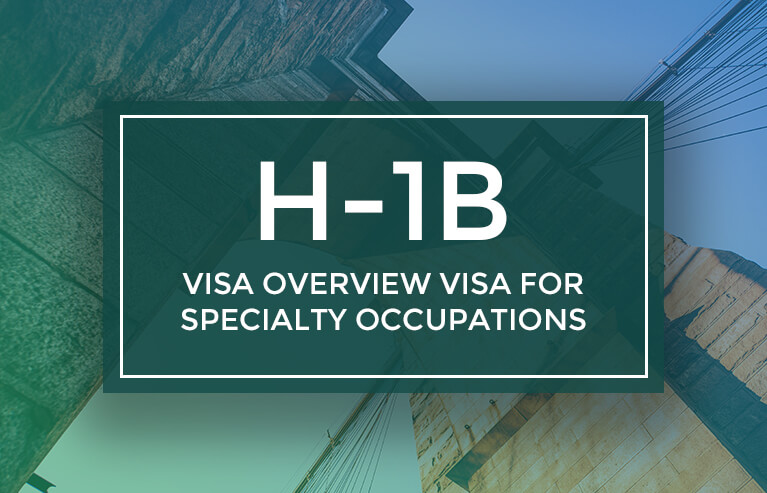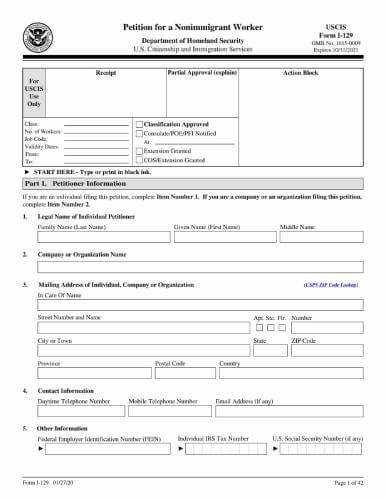H-1B VISA OVERVIEW VISA FOR SPECIALTY OCCUPATIONS
Work visa H-1B is one of the most popular categories of H-1 visas. It is available for those that want to work in the U.S. However, H-1B Visa isn’t an appropriate solution for the majority of applicants. As a rule, this visa works for highly specialized experts only, including those that work in the field in which a bachelor’s degree (or higher) or unique training is required. The temporary work visa H-1B allows pros to enter the U.S. and get a temporary employment, according to their occupation. This visa is often used by IT-specialists, accountants, architects, designers, engineers, professors, researchers, teachers, and others. It allows them to gain a vast field experience in the U.S., while receiving a proper salary.
This kind of visa has its own pros and cons. Let’s overview the most important ones:
- Permission to Work H-1B Visa allows specialists from abroad to enter the U.S. and get employment in their field for a limited term. This visa should be sponsored by the U.S. employer as any other work visa.
- Earnings The H-1B Visa employee can receive salary from the employer.
- Duration As a rule, H-1B Visa is issued for 3 years. However, you may extend it before it ends up to 6 years (or 10 years maximum for some public offices).
- Spouses and Children Spouses and children under the age of 21 can reside in the U.S. during the period of the H1B visa holder’s authorized stay. They should apply for H-4 visas that are not allowing any employment in the U.S.
- Dependents can attend school or college. The spouse and children under the age of 21 can attend school as the H-4 visa holders.
- Multiple Employments A few H-1B visa petitions may be in effect simultaneously. It allows the H-1B employee to work for two or more employers during the same limited time frame.
H-1B Visa requirements to applicants
The prospective worker must possess at least the U.S. bachelor degree or its foreign equivalent in the field related to the specialty occupation. The equivalent to the U.S. bachelor degree may be gained by the field expertise through a number of positions with a progressive responsibility. If the H-1B Visa applicant doesn’t have a bachelor degree, 3 years of training and work in the field are considered equal to one year of education in a university. If the applicant possesses a foreign degree that is equal to the U.S. bachelor degree, the United States Citizenship and Immigration Service (USCIS) may ask for a credential evaluation.
There must be the U.S. employer that is offering employment under the “specialty occupation”. This offer is about providing certain services under this occupation. The services may require theoretical and practical specialized knowledge and a bachelor or higher degree in the field. It’s a minimum for commencing employment. It may be a full-time as well as part-time employment. If any licensure is required, the Applicant must hold it under the state law.
The U.S. company must be legally registered with the IRS number. The U.S. employer must have the Labor Condition Application (LCA) approved with the U.S. Department of Labor (DOL). The U.S. employer should accept transportation cost if the H-1B employer decides to stop working prior to the end of the authorized stay.
Restrictions
The employment can’t start until the USCIS approves it and the appropriate visa will be issued. The employers can be changed during the six year H-1B visa duration. But each new U.S. employer must be approved by the USCIS.
H1B visa for the specialty occupation has an annual numerical quota. The spouse and children under the age of 21 of the H-1B visa holder don’t have the permit to work.
H-1B Visa Procedure is similar to any other non-immigrant visa application. You should fill the DS-form and then schedule the interview in the nearest U.S. Embassy or the U.S. Consulate.
- Determination of the Prevailing Wage.
- All American companies that want to hire foreign specialists should get the approved LCA first. It can be started with filling the ETA 9035E form. The employers indicate there the number of years they would like to hire foreign specialists for. This form guarantees that the employer can provide safe, adequate and fair working conditions for the foreign specialists.
- The I-129 form is required in all the following cases:
- If the foreign employee is planning to work in two American companies, each of them should send the I-129 form to the USCIS;
- If the foreign employee wants to extend the H-1B Visa, the U.S. employer must file the I-129 Form again;
- If the specialist is being transferred to a new company, a new employer must file a new I-129 Form.
The other Forms and Documents are the following:
- G-28 Form;
- Copy of the passport of the applicant;
- Copy of the applicant’s academic diploma;
- Copy of the labor contract signed by the applicant and the U.S. employer;
- Tax returns for companies;
- Payroll reports for similar positions;
- Photos of the business property;
Processing Times:
LCA: within 7 days
USCIS: New Petition – from 2 to 5 months
USCIS: Transfer or Renewal/Extension – from 2 to 5 months
USCIS: Premium Processing Service – within 15 days
Please complete and submit the form on our website to get the answer to any general question regarding H-1B Visa.


 Form I-129 | Petition for a Nonimmigrant Worker
Form I-129 | Petition for a Nonimmigrant Worker